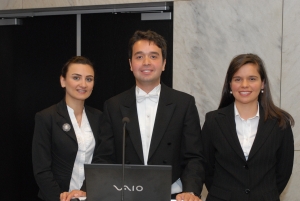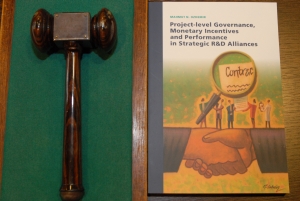Project-level Governance, Monetary Incentives and Performance in Strategic R&D Alliances
 Strategic R&D alliances are collaborative agreements between firms to develop new knowledge and products. Firms pervasively use these alliances to fill their product pipelines. As a consequence, a growing number of products that were developed in these alliances have become essential parts of our lives. For instance, without these alliances, we will neither be drinking coffee made by coffee machine Senseo (Philips-Douwe Egberts alliance) nor recovering from swine flu by taking Tamiflu (Roche-Genetech alliance). However, forming successful R&D alliances is easier said than done. Their idiosyncratic difficulties mostly cause pre-mature terminations.
Strategic R&D alliances are collaborative agreements between firms to develop new knowledge and products. Firms pervasively use these alliances to fill their product pipelines. As a consequence, a growing number of products that were developed in these alliances have become essential parts of our lives. For instance, without these alliances, we will neither be drinking coffee made by coffee machine Senseo (Philips-Douwe Egberts alliance) nor recovering from swine flu by taking Tamiflu (Roche-Genetech alliance). However, forming successful R&D alliances is easier said than done. Their idiosyncratic difficulties mostly cause pre-mature terminations.
One of the underlying failure reasons is the wrong managerial choices pertaining to the governance mechanisms of an alliance. In his PhD dissertation entitled Project-level Governance, Monetary Incentives, and Performance in Strategic R&D Alliances, Mahmut Ozdemir attempts to improve our understanding of how these governance mechanisms enhance the likelihood of development success: What are their upsides and downsides? When do firms offer higher performance based monetary incentives? When do firms form complex governance mechanisms to monitor alliance projects?
Interestingly, Ozdemir finds that performance-based monetary incentives have a positive and project-level governance has a negative effect on alliance innovation performance. The results also show that firms typically use them in combination, i.e. it is uncommon to observe an alliance with high monetary incentives and low project-level governance, and vice versa. Therefore, the positive effects of relatively higher monetary incentives are usually offset by the negative effects of intense project-level governance, i.e., the net effect on performance is neutral.
These findings can be relevant for firms that actively form alliances. According to Ozdemir, alliance deal makers, alliance managers and the senior managers appointed to steering committee roles of alliances are among the people who will be interested in these results.
Mahmut Ozdemir defended his dissertation on June 21, 2011 at Rotterdam School of Management, Erasmus University (RSM). His promoter was Prof.dr.ir.J.C.M van den Ende. Other members of the Doctoral Committee were Prof.dr. J.Y.F. Wynstra, Prof.dr. J.J.P. Jansen, and Prof.dr. D. Deeds.
About Mahmut Ozdemir
Mahmut Nedim Ozdemir (Ankara, Turkey,1981) holds a BSc (High Honors), in Industrial Engineering from Bilkent University, Ankara, and double MSc degrees in Management and Industrial Engineering (both High Honors), from Sabanci University, Istanbul. He joined the Rotterdam School of Management, Erasmus University, in 2006, as a PhD candidate. He will be Assistant Professor of Strategy and Management at Koc University, in Istanbul, Turkey, starting from July 2011.
His main research interests include strategic management, innovation management, and entrepreneurship. Particularly, he studies the performance impacts of alliance governance mechanisms in the context of startup-incumbent strategic R&D alliances. He has presented the results of his research at numerous conferences throughout North America and Europe, including the Strategic Management Society, the Academy of Management, the International Society for Professional Innovation Management, and the International Product Development Management. His research is currently under review in the top management journals such as the Strategic Management Journal. He was in the finalists of the Strategic Management Society Conference Best PhD Paper Award, in 2009. He is an ad hoc reviewer of the Journal of Management Studies. He is a member of the Strategic Management Society and the Academy of Management.
He taught open innovation courses at Erasmus University. He coached and supervised master theses at the same university. He was one of the members of a joint research project among Erasmus University, Delft University and several industrial partners such as FrieslandCampina, Philips Design, and DAF Trucks. In this project, he developed an alliance management tool for organizing project teams in strategic R&D alliances. During his PhD, he also collaborated with the U.S.-based consultancy firm, Deloitte Recap, LLC.
Abstract of Project-level Governance, Monetary Incentives and Performance in Strategic R&D Alliances
 A growing number of firms rely on strategic R&D alliances to develop new products. In these alliances, firms use various kinds of governance mechanisms for incentive alignment. Project-level governance, i.e., the daily control of alliance activities by firms’ alliance representatives such as steering committee members, alliance managers, and project managers; and, performance-based monetary incentives, i.e., the potential milestone payments tied to the performance of partners, are two governance mechanisms, increasingly used in practice, yet overlooked in the strategic alliances literature. In this dissertation, Ozdemir examines the antecedents and performance outcomes of these two governance mechanisms in the biopharmaceutical industry setting.
A growing number of firms rely on strategic R&D alliances to develop new products. In these alliances, firms use various kinds of governance mechanisms for incentive alignment. Project-level governance, i.e., the daily control of alliance activities by firms’ alliance representatives such as steering committee members, alliance managers, and project managers; and, performance-based monetary incentives, i.e., the potential milestone payments tied to the performance of partners, are two governance mechanisms, increasingly used in practice, yet overlooked in the strategic alliances literature. In this dissertation, Ozdemir examines the antecedents and performance outcomes of these two governance mechanisms in the biopharmaceutical industry setting.
The results of this dissertation suggest that project-level governance and monetary incentives offset each others’ effects on alliance innovation performance in the context of startup-incumbent alliances. In other words, offering greater monetary incentives to startups has minimal positive effect on development success, if incumbents opt for intense project-level governance by their controllers at the same time. On the other hand, the results suggest that greater monetary incentives result in higher abnormal stock returns to startup firms following alliance announcements. The results also reveal the positive reciprocal relationship between project-level governance and monetary incentives. The greater the project-level governance, the higher the size of potential milestone-payments, and vice versa. Hence, the incumbents that exercise intense governance on startups in alliances offer also higher potential milestone payments to compensate for the performance risks of startups. The results also show that project-level governance positively influences the contractual detail, which in turn increases the likelihood of development success. Finally, the results reveal several other exogenous and endogenous antecedents of both governance mechanisms.


